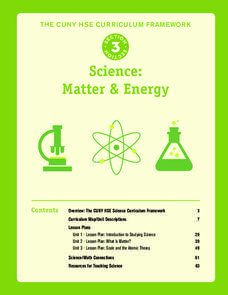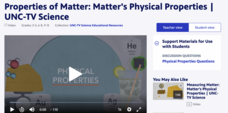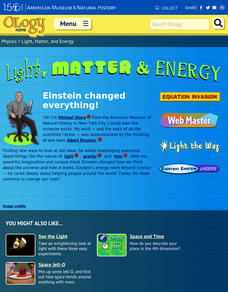Scholastic
Study Jams! Properties of Matter
Does matter really matter? Properties of matter are discussed by Sam and RJ: mass, volume, and density. They differentiate between mass and weight. They explain how to measure these properties. Make sure to teach your class about other...
PBS
The 3 Phases | Phases of Matter | UNC-TV Science
Explore the states of matter without the mess or expensive equipment in a compact, informative activity. Scientists watch as the narrator explains the three states of matter using a glass of ice and soda in an animated video that...
Aquarium of the Pacific
States of Matter: Making Ice Cream
Who knew that learning about the states of matter could taste so sweet? This fun hands-on lesson captures the attention of learners as they use what they know about solids, liquids, and gases to create their very own batch of ice cream.
Center for Learning in Action
Introduction to Matter
Begin your states of matter lessons with a demonstration designed to introduce the concept that all matter has properties. Reinforce this concept through vocabulary exploration, and the creation of atom models; salt, water, and carbon...
Center for Learning in Action
Introduction to the States of Matter
Liquids, gases, and solids are the states of matter in which scholars investigate in a lesson plan that offers in-depth information and engaging activities that look into the three states and the changes their properties make when mixed...
Science 4 Inquiry
States and Phases of Matter
Plasma is the most common phase of matter in our universe. Scholars explore the change of energy as molecules change phases of matter. They rotate through stations, graphing the changes in energy level.
PBS
What's the Matter? | UNC-TV Science
Explore what makes up the universe and demystify the complex ideas of matter and the atom. Group members watch a video with explanations, animations, and examples that discuss the characteristics and importance of matter. Scholars then...
Curated OER
Science: Matter and Energy
Designed to use when teaching adults preparing for their high school equivalency exam, the resource integrates reading practice, writing, and analytical thinking in every lesson. The unit covers 23 topics, but it only includes three...
Normal Community High School
Classification of Matter
Steel is an example of homogeneous mixture, also called an alloy, which is made of iron and carbon. The presentation introduces learners to elements, compounds, and mixtures. They explore their similarities and differences, and then take...
PBS
Properties of Matter: Matter's Physical Properties | UNC-TV Science
Does gold really boil? Learn what temperature gold boils at and more using an animated activity about the properties of matter. Scientists learn about the properties of matter including examples of physical properties, the effect changes...
PBS
Categorizing Matter | UNC-TV Science
Take the difficulty out of classifying matter with an easy-to-follow activity that makes distinguishing between pure substances and mixtures simple. Scholars explore how matter is grouped between two categories—pure substances and...
PBS
Phase Changes | Phases of Matter | UNC-TV Science
Take an energetic ride through the phase changes of a water molecule in a compact activity. Young scientists learn about the phases of matter and discover the role of thermal energy in governing phase changes while watching a short...
Science Matters
Matter Cycles — Sum It Up
Scholars become part of the cycle of matter with a reader's theater that showcases producers, consumers, decomposers, and the sun. A diagram and discussion concludes the learning experience and enhances comprehension.
Department for Children, Schools and Families
Explaining Change Processes Using a Simple Particle Model of Matter
The more things change, the more they stay the same. This unit includes seven lessons starting with physical change and moving through to chemical change. Conservation of matter is explained clearly with multiple hands-on activities and...
Center for Learning in Action
Density
Explore the concept of density within states of matter—gases, liquids, and solids—through a group experiment in which young scientists test objects' texture, color, weight, size, and ability to sink or float.
Teach Engineering
The Building Blocks of Matter
Everything can be reduced to atoms. The first installment of a six-part Mixtures and Solutions unit focuses on the building blocks of matter. Scholars review basic atomic structure, including protons, neutrons, and electrons, in...
Scholastic
Study Jams! Solids, Liquids, Gases
Your physical science class learns that there are three states of matter, and that adding or removing heat can cause it to change from one state to another. By the animations, printed information, and discussion between RJ and Zoe, they...
Michigan State University
Gases Matter
Young scientists learn that seeing isn't necessarily believing when it comes to the states of matter. After performing a fun class demonstration that models the difference between solids, liquids, and gases, children complete a series of...
Mr. E. Science
An Introduction to Matter
What's the matter? Gas, solid, liquid, or plasma. The presentation covers how to describe and identify matter, changes in matter, types of matter, measuring matter, particles of matter, Democritus, and John Dalton's Atomic Theory.
Center for Learning in Action
Investigating Physical and Chemical Changes
Super scientists visit ten stations to predict, observe, and draw conclusions about the physical and chemical changes that occur when different states of matter—liquid, solid, and gas—are placed under a variety of conditions. To...
Anti-Defamation League
Intent vs. Impact: Why Does it Matter?
Contrary to the popular saying, words can hurt. Words matter! Tweens and teens can reflect on how words impact others even if the intent wasn't how the words were perceived. After examining an Instagram post where Lizzo apologized for...
Mr. E. Science
Changes in Matter
Do solids, liquids, and gases even matter? The presentation focuses on changes in matter, including phases, Boyle's Law, Charles' Law, and physical changes.
Columbus City Schools
What’s Up with Matter?
Take a "conservative" approach to planning your next unit on mass and matter! What better way to answer "But where did the gas go?" than with a lab designed to promote good report writing, research skills, and detailed observation. The...
American Museum of Natural History
Light, Matter and Energy
Let Einstein's work shine the way. Pupils read about Einstein's iconic equation, E=mc^2, using a remote learning resource and see how ideas from other scientists such as Kepner, Curie, Galilei, and Newton led to its discovery. They...
Other popular searches
- States of Matter
- Properties of Matter
- Physical Science Matter
- Phases of Matter
- Conservation of Matter
- Classification of Matter
- Science Matter
- Matter and Atoms
- Physical Properties of Matter
- Composition of Matter
- Cycles of Matter
- Changes in Matter

























